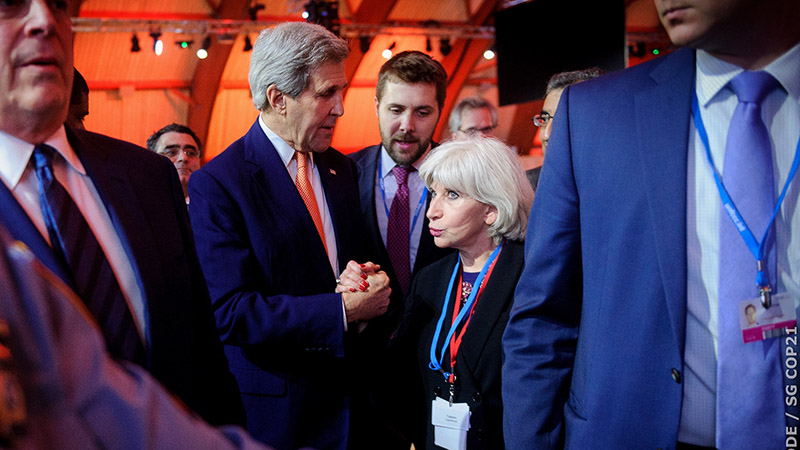Brace yourselves for a climate change showdown at the G20 in July.
That’s the prediction of Laurence Tubiana, France’s climate change ambassador from 2014-2016 and one of the architects of the 2015 Paris Agreement.
“It is key,” she tells Climate Home. “It is something we should prepare for carefully, it should be a test of governments, civil society, companies to stick to the [Paris Agreement] goals.”
If the advent of Donald Trump’s reign as US president strikes fear into the hearts of environmentalists, the prospect of Angela Merkel fighting their corner at the Hamburg G20 offers some relief.
The German chancellor faces an election later this year, but remains bullish on the need to slash greenhouse gas emissions and has told her administration to make it a priority for 2017.
Asked about Merkel, who was involved in UN climate talks as an environment minister in the early 1990s, Tubiana is unequivocal. “She is a leader,” she says.
The question is how far Merkel wants to push it, both at the G20 and in other forums.
The early indications are positive. An EU source recently told Climate Home Germany and China had discussed taking over the Major Economies Forum, a group of 17 nations founded by the US in 2009 to talk climate.
It looks unlikely team Trump know what the MEF is, let alone have plans to resurrect it. But there’s an opportunity, spies Tubiana, for a “different grouping and design” to reflect a new world order.
“I think Germany is thinking who it could invite to a new MEF,” she adds. It’s an intriguing question, reflecting a multi-polar climate landscape.
Check the blueprints for Trump’s climate wipeout – @edking_CH analysis: https://t.co/73NY8msmUx pic.twitter.com/YxFpr8fTbI
— Climate Home News (@ClimateHome) January 31, 2017
While the US and China are way out front as the world’s biggest emitters, the chasing pack is huge. The EU, Russia, India, Indonesia, Brazil and a flock of fast-growing Latin American countries are big players.
We are looking at “distributed leadership” says Tubiana. She acknowledges the US-China climate deal in 2014 as vital for the Paris Agreement, but says it was a floor – not a ceiling – of global action.
She cites the self-described “High Ambition Coalition” of developed and vulnerable nations that emerged in Paris. “Now there are new African countries leading – look at Ethiopia, Kenya and others like Morocco which I think will continue to push on after hosting COP22 [the 2016 UN climate summit]”.
It’s a theme she returns to frequently, a conviction that tackling climate change is no longer an issue of getting the US and China to act.
Weekly briefing: Sign up for your essential climate politics update
Take, for example, Saudi Arabia. The oil-rich Kingdom has long tried to block efforts to deliver a global climate pact, right up to 2015 when it found itself outflanked and thin on friends.
That’s one narrative. Tubiana plays another, describing a shift in political opinion in Riyadh over the past 2-3 years, to the point where its state oil firm can announce plans to invest up to $5 billion in clean energy.
“It’s a first step. They don’t feel anymore this [the UN climate deal] is an enemy. They have a huge interest in diversifying,” she says, recalling her multiple visits to the Saudi capital ahead of the Paris talks.
“It makes sense, it’s rational, logical and it was decided and prepared. For me it’s the resilient part of the huge reforms they are implementing.”
Canada offers another potential source of leadership, with Justin Trudeau’s government keen to differentiate itself from Trump, and pushing – slowly – for a greener economy.
Tubiana knows Ottawa’s environment chief Catherine McKenna well, and describes Canada’s stance on climate as a “balance” between oil-wealthy states like Alberta and the desire to green its economy.
Critics – including this site – have asked how Trudeau’s support for multiple oil pipelines marries with his desire to promote his country as a climate progressive.
Tubiana is prepared to be more generous: “We see he is really committed and I have no doubt about this, it’s important for him to show Canada is not an annexe of the US.
“I think we can rely on them… we see the compromises and the difficulties but they are part of the coalition of the ones who want an ambitious deal.”
196 countries to Trump – UN must tackle climate change: https://t.co/Eyj1C7eoWy #COP22 pic.twitter.com/dHmFY5Jqaa
— Climate Home News (@ClimateHome) November 18, 2016
Still, no conversation on climate leadership is complete without discussing Beijing and Washington, so long the twin heartbeats of global climate talks.
An attempt by countries to stand up for the Paris Agreement last November, with the “Marrakech Call” underlining global support for the UN deal “did not seem to resonate” with Trump’s team, she admits.
“It was important to demonstrate to the new administration there is a cost to exit, but the best way is to increase action at home. The big concern is funding – nobody can fill the gap the US would leave,” she says.
Yet with China – as with Germany – there lies the kernel of hope, she says, a country so vast that once set on course it will not deviate.
“It was striking in Davos, I have no doubt about their policy, the line is clear: they want to lower their coal use and be the first to win the electric car race.
“They have a strategy and they have all the resources to deploy it, and from what I see of this AIIB [Beijing-headquartered Asian infrastructure bank] they will not fund any more coal.
“There is no sign the green economy is panicking – what will have to happen is implementation at home to change the atmosphere.”
